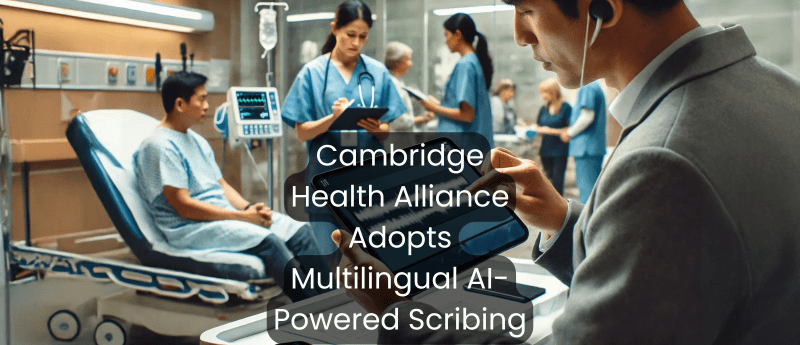Cambridge Health Alliance Adopts AI-Powered Scribing to Improve Multilingual Medical Note-taking

Cambridge Health Alliance (CHA) (MA, U.S.), Harvard’s teaching hospital, is deploying Abridge (KS, U.S.), an AI-powered medical scribing technology to support multilingual notetaking. This collaboration aims to enhance the efficiency and accuracy of medical notetaking for CHA’s multilingual patients, empowering clinicians to better serve diverse communities.
How Can Abridge’s Technology Make a Difference?
For many hospitals and clinics, AI-driven medical scribe tools that support multiple languages are crucial for effectively caring for a diverse patient population. This is when the technology powered by Abridge, which uses AI to translate in real-time, becomes useful.
Abridge’s technology can ease conversations between clinicians and patients who don’t speak the same languages. With its speech recognition and natural language processing tools, the company supports 28 languages, including the 16 most widely spoken in the U.S.
“The way our technology works is it automatically detects what language you’re speaking in so that you don’t need to, as a clinician, in advance, go through any menus or select any specific languages, anticipating what you’re going to speak in. The technology’s job is to recognize those languages, to detect them, recognize the words, and then generate the note afterwards.”
Shiv Rao, M.D., CEO and Founder of Abridge.
Abridge’s multilingual capabilities can become very useful for CHA — to enhance a broad spectrum of medical specialities. Its technology could empower clinicians to engage more effectively with, and better serve, their diverse patient populations.
According to Hannah Galvin, CHA’s chief medical information officer, nearly half of patients speak a language other than English as a primary mother tongue, including Spanish and Portuguese.
“We needed a tool that would work just as well with interpreters and have found that Abridge does that; in fact, some of our interpreters have found that Abridge has picked up things that they missed in their translation. Moreover, many of our staff are certified as bilingual, and we have so far found in our pilot that Abridge does well to understand visits conducted in Spanish, drafting the note in English. We are collecting data on other languages and hope to publish this with Abridge soon”.
Hannah Galvin, M.D., CHA’s Chief Medical Information Officer.
During the pilot phase of Abridge’s technology at CHA, there was a 12.6% reduction in the time clinicians spend working on documentation outside of working hours and a 22.8% decrease in time spent on note-taking each day during working hours. Additionally, Galvin remarked: “but more than the quantitative data, we had a number of providers who have reported that the Abridge ambient technology is ‘life-changing'”.
Abridge is not the only one that is using AI for medical scribing. Recently, the tech giant Zoom partnered with Suki, a medical scribe provider, to enhance clinical notetaking and allow physicians to invest more time in patient interaction. Additionally, major technology companies, including Microsoft, Amazon and Google have also focused their efforts on developing technologies to enhance medical practices and improve patient care.
The Downsides
While CHA and Abridge’s collaboration offers significant benefits in improving multilingual notetaking and clinician efficiency, there are notable risks associated with this.
One major concern is the reliability of AI tools, as some of them have been criticized for containing biased and inaccurate information. An example of this is Whisper, the popular transcription tool powered by OpenAI, which was recently found to be “hallucinating” text. Therefore, although Abridge’s technology has shown promise, issues like the misunderstanding of language, especially in complex medical contexts, could cause considerable errors, including misdiagnosis and biased interpretations, to name but a few.
Additionally, a recent study found that nearly half of the AI-powered devices approved by the U.S. Food and Drug Administration (FDA) do not meet clinical validation requirements. Among the assessed FDA-approved devices, 43% lacked published clinical validation data. Some tools were trained on computer-generated images instead of real patient information, falling short of proper clinical validation standards.
Moreover, there are also significant concerns surrounding patient privacy, which may be compromised due to the use of non-consensual patient data A recent example of this is the controversy around Australia’s imaging giant I-MED, which was under investigation for an alleged data breach in AI training last September.
The application of Abridge at CHA should be met with caution, as it is a relatively new technology. Further extensive clinical validation may be needed to ensure its efficacy and safety in real-world clinical settings. These risks underscore the importance of rigorous oversight, transparent data practices, and comprehensive validation to ensure that AI technologies like Abridge’s can truly enhance patient care without compromising accuracy, privacy, or trust.